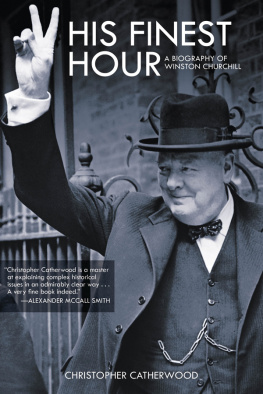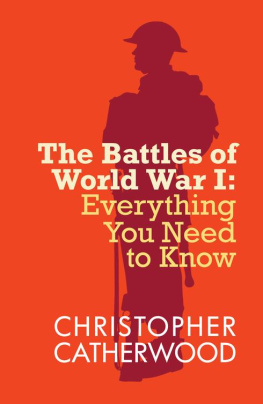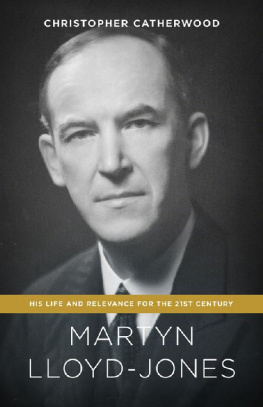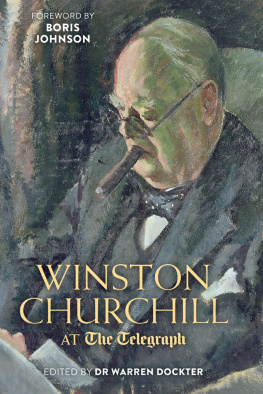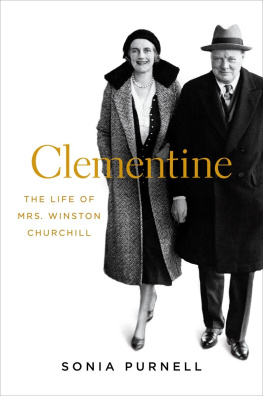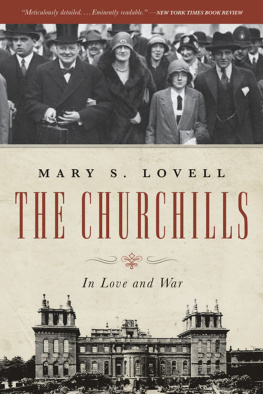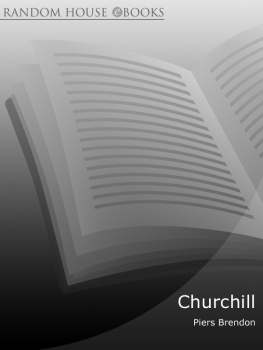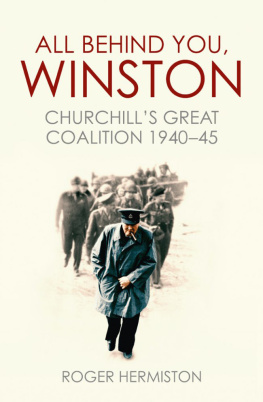Dr. Christopher Catherwood is a fellow of the Winston Churchill Memorial Trust and was twice holder of an archives by-fellowship at the Churchill Archives Centre of Churchill College Cambridge, where he remains as an associate of the Senior Combination Room. He is also a fellow of the Royal Historical Society.
He is the author of many books on Winston Churchill, including Churchills Folly (in the United Kingdom, Winstons Folly), on Churchills creation of Iraq in 1921, and more recently Churchill: The Greatest Briton, a biography of Churchill in photographs that was made a Churchill Heritage Book. He has lectured on Churchill at Westminster College in Fulton, Missouri (the same place Churchill made his Iron Curtain speech) and at the University of Richmond, Virginia. His latest book on Churchill is Churchill and Tito, based on the archives of MI3 in England and those of the Office of Strategic Services in the National Archives in the United States.
He was educated at Westminster School, Balliol College Oxford (where he studied history), Sidney Sussex College Cambridge, and at the University of East Anglia, where he earned his PhD on Churchills Iraq policy.
He taught history classes for the University of Richmond, Virginia, summer school for many years and has taught 20th-century history at the Wake Forestaccredited INSTEP programme in Cambridge, United Kingdom, for more than 20 years.
He is the widower of an American musicologist, Paulette, who died in 2018 and to whose memory this book is dedicated.
It is very strange, after almost 30 years of happy marriage, not to be able to thank my wife, Paulette, in beginning my acknowledgements. She was still alive when this book was commissioned; sadly, she did not live to see its completion or publication. She suffered from Parkinsons disease, and for eight heroic years, she beat all expectations on how long she would survive. Happily for her but tragically for the rest of us, she died on 6 June 2018, just before our wedding anniversary and her birthday. Without her, none of the many books I have written in these past decades would have happened; it was because of her that I was able to resume my writing career early in our married life, and it was because of her incomparable encouragement sustaining me that all the others were able to be written. She was my muse and companion, best friend and inspiration, and my acknowledgements to her go beyond words. Thankfully, throughout all this sorrow, I was gloriously kept going by fabulous friends and colleagues.
The Churchill Archives Centre staff team at Churchill College Cambridge are simply incomparable. With this book, as with my others on Churchill, military history, and similar topics, they have been wonderful. I could not want for a better place to work. (As always, I should say here that the conclusions I draw in this book are my own.) Allen Packwood, the director, was most deservedly given the British honour of Officer of the Order of the British Empire for his services to the Churchill collections. This book is a huge tribute to his leadership of so happy a team, as well as his years of encouragement and inspiration to so many historians.
Warmest thanks, too, go to Andrew Riley and, in this case, also to his wife, Fiona: They have sustained me with their cheerfulness, encouragement, and morale-boosting kindness during Paulettes struggles, and, with Allen, they have kept me going. Many special thanks, too, to Sophie Bridges (and her partner, Patrick), with whom Paulette and I shared mutual friends. And much gratitude to all the other splendid members of the staff: Amanda Jones, Sarah Lewery, Natalie Adams, Madelin Evans, Hannah James, Katherine Thomson, Tom Davies, Dr. Heidi Eggington, Erica DAlessandro, Julia Schmidt, and Macaulay Bristow.
Churchill College is in itself a magnifi-cent place, an especially happy collegiate community with an atmosphere of warmth, openness, and civilisation rare in academia, an egalitarian environment and utter lack of entitlement and stuffiness rarer still in an internationally elite university. The master, Dame Athene Donald, is an inspiration to women in science, and she and her husband, Matthew, were so supportive when Paulette died. So, too, were many members of the wider college, whose friendship now over many years has been both so enjoyable and enhancing. Professor Alec Boksenberg, Professor Douglas Gough, and Professor Christopher Toutthree distinguished astronomershave shown that scientists and those in the humanities can bridge the chasm between disciplines. The senior tutor Richard Partington and Peter Sloman have enabled me to have historian friends in a college mainly of scientists, and Adrian Crisp and Barry Phipps (a medic and an art historian) are a daily joy with whom to have lunch. I could easily thank yet more people in the Churchill community.
My mother, Elizabeth Catherwood, was widowed when my father died in 2014 and so has been both empathy and maternal care personified. She and my wife were gloriously close, and so her support for me since Paulette died has been beyond gratitude. My mother lived through and survived the Blitz in London, so for her, Churchill is no mere name or historical figure but someone to whom she and her family looked for constant inspiration throughout the war. She heard the BBC radio versions of many of the gripping speeches in this book.
I thank her committee of friends for helping me, as well as for 40 years of friendship with my mother! Her friend Scilla Harvey and a mutual friend of my wifes and Scillas, Diana Edwards, gave invaluable practical help and financial advice, both during Paulettes final illness and after her death.
The acknowledgements cannot possibly thank everyone at Addenbrookes Hospital in Cambridge who cared for Paulette in the last years of her life, especially toward the end. Her consultant Philip Buttery was all a specialist should be, and the Palliative Care and Parkinsons teams were beyond magnificent, giving her some 10 extra months of life and, in finding a specialist neurological treatment unit (Eden View in Bottisham), ensured that her last weeks were in comfort, privacy, and dignity.
Friends from university days, mine and Paulettes, have been a total joy to me as an author since that now-far-off time, as well as to Paulette in her happy years as a widely loved music teacher and in her final years. For me, Andrew and Clare Whittaker (and their daughters, Charlotte and Rosie, my god-daughters), Claude and Leigh Marshall (and their daughter, Lauren, and Laurens husband, Tristan), Betsy Brandt (and her husband, Lamar), and Jonquil Drinkwater and Andrew Kearsley (and their child, Jack, and her parents, Geoff and Gill Drinkwater) truly have been friends for life and friends indeed. All of them have been fabulous encouragers of all my books, this one very much included. I could not have finished this book without them.
As with Addenbrookes Hospital, so with All Saints Little Shelford, the quaint and now-thriving parish church where Paulette and I made our spiritual home. Among many people to thank there are the rector Simon Scott and his wife, Susu; the curate Christopher Henderson and his wife, Rachel; Professor Hill Gaston and his wife, Christine; John and Polly Stanton; John and Jane Graves; Jason and Fiona Fletcher; Royston and Ros Shufflebottom (and their daughter); the members of the Tuesday morning Rectory Bible Study; and many profoundly supportive members of the congregation too numerous here to mention.
Richard and Sally Reynolds have also been magnificent friends and, since Richard is one of the senior buyers at Heffers and the chairman of judges for a distinguished fiction award, a source of deep literary wisdom. Falcon Green and Peter Sowden have been brilliant in showing me how to live as a widower, and Peter is also an academic books editor with years of experience. Alasdair and Rachel Paine and Nathan and Debbie Buttery were invaluable friends of Paulettes throughout her illness and have been rocks of support to me since her passing. Childhood friends have very happily reappeared in my life when I needed them: the Leggett family (Martyn, Susan, Jane and Anniefriends of Paulettesand James).


